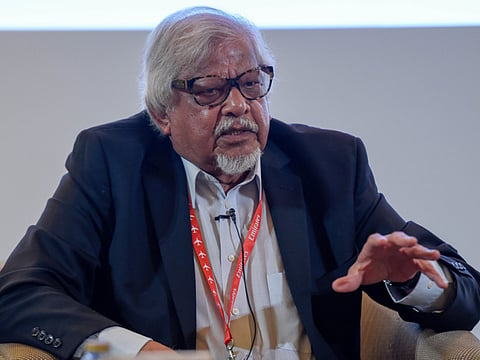'My parents went on a fast when we misbehaved'
Arun Gandhi, grandson of India's founding father, outlines how penance, not punishment, wins kids over

Dubai: Parents should teach children through “penance” — instead of punishment — to embrace non-violence as a way of life, says author Arun Gandhi, the grandson of Mahatma Gandhi.
Speaking at the Emirates Airline Festival of Literature in Dubai on Saturday while giving a talk on his book The Gift of Anger And Other Lessons From My Grandfather Mahatma Gandhi, he drew on examples from his own upbringing.
Now in his 80s, he said it was natural for people — including parents — to get angry when their children did something wrong.
But “what is not natural for us is to abuse that anger”.
Highlighting what he described as the "transformational" power of self-atonement, Gandhi said his parents, rather than punish them during their younger days, would refuse to eat for days, for instance, when he and his siblings misbehaved, saying they had fallen short in raising them well.
Non-violent parenting
This would make him introspect on his shortcomings and resolve not to place his parents in such a predicament again.
“The way we perpetuate violence over and over again, through the ages, is the way we parent our children. We use violence, we threaten our children because we have the power to threaten them and punish them every time they misbehave… It’s always some punishment,” Gandhi said.
“And in non-violent parenting, it’s not punishment but penance that is important. My parents believed in non-violence and they practised it at home. So whenever we — my two sisters and I — misbehaved in any way, we were not punished.
"They [his parents] did penance… Because the relationship between the parents and us was based on mutual love and respect for each other, we felt awful when that kind of thing happened and we made sure that next time it didn’t happen.”
Gandhi recalled a life-changing experience with his father, which made him abandon lying.
Gandhi, then 16, was an hour late in picking up his father after a conference in a town far from their country house in South Africa.
The teen had overspent his time in a cinema watching a violent film, but lied that the servicing of the family car at a garage had taken too long.
Unknown to Gandhi, his father had called the garage when he hadn’t shown up on time.
My father walked home
“When he caught me in the lie, he said: ‘There’s something wrong in the way I’ve brought you up that didn’t give you the courage to tell me the truth, that you felt you had to life to me. And in order to find out where I went wrong, I’m going to walk home. I’m not coming with you.’”
After failing to change his father’s mind, Gandhi “crawled” with the car for 18 miles behind his father who walked through the difficult countryside for nearly six hours that night.
“Watching him go through the pain and agony for my stupid lie, I decided there and then, I was never going to lie again. I think that was a very powerful lesson in non-violent parenting,” Gandhi recalled.
Sign up for the Daily Briefing
Get the latest news and updates straight to your inbox


